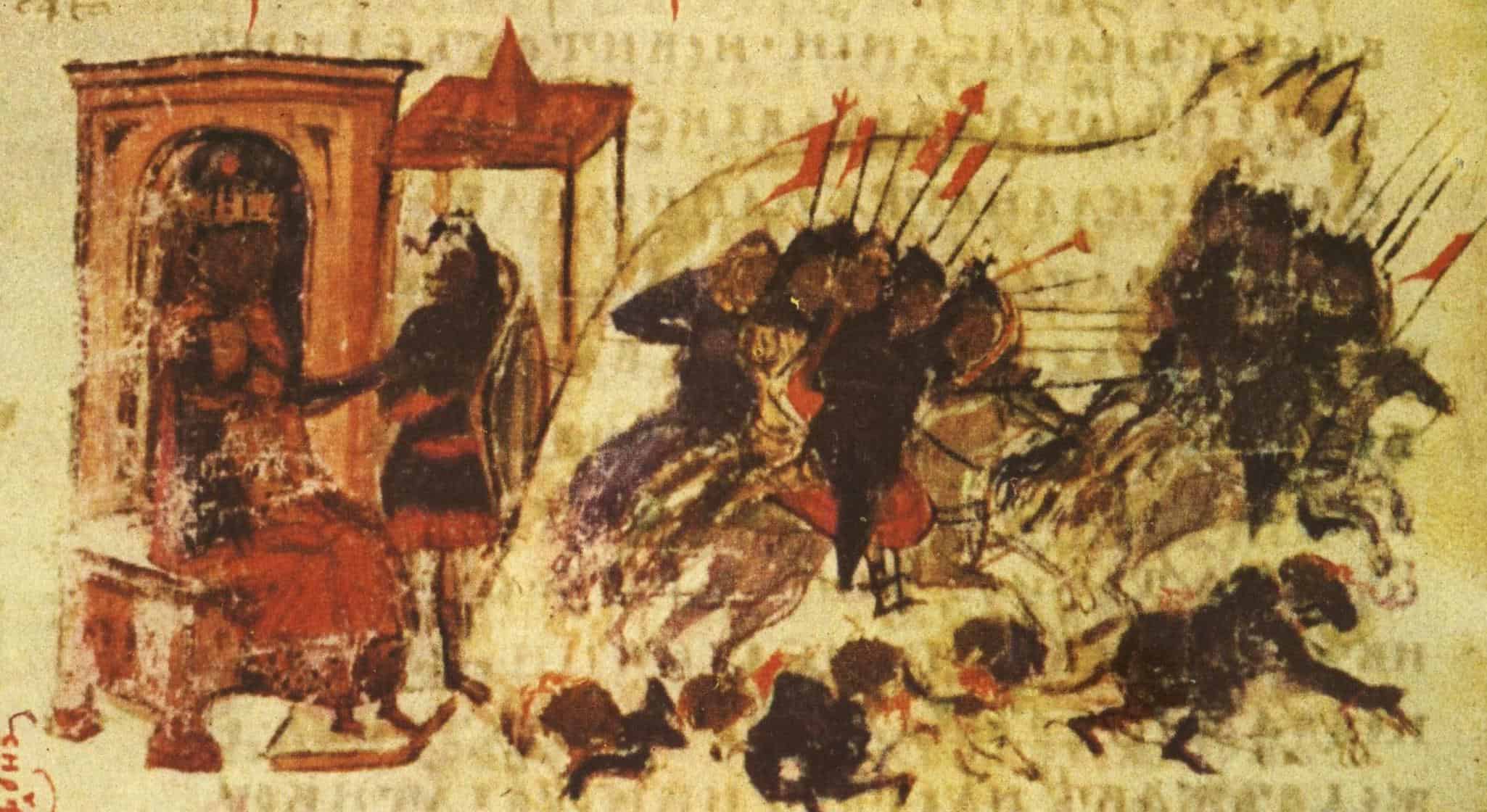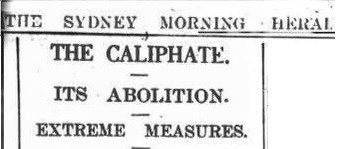It is impossible to profile ‘Umar ibn ‘Abdul Aziz without mentioning the fateful incident involving his namesake, Ameer Al-Mu’mineen ‘Umar Ibn Al-Khattaab Al-Farooq (ra) who was once walking in the streets of Madeenah with the grandfather of Zaid bin Aslam as he used to do so as to see to the affairs of the Muslims. On this particular occasion, Allah سبحانه وتعالى decreed that an event would occur that would have consequences that could not be foreseen at that time.
Whilst ‘Umar was leaning on a wall he famously overheard a conversation between a mother and her daughter. The daughter had collected milk for that day to be sold, but the milk was less than expected, so her mother told her to mix water with the milk to increase it in volume. The daughter objected and told her how the Khaleefah ‘Umar Ibn Al-Khattaab had forbidden mixing of milk with water to be sold in the markets. The mother responded by telling her that ‘Umar was not present and that nobody would know, but her daughter objected and reminded her that although Umar was not present Allah was watching. She said: “I cannot obey Allah in public and disobey Him in private.”
When ‘Umar heard this he told the grandfather of Zaid bin Aslam to find out about this person and when he found out that she was not married, he decided to marry her to one of his sons. He approached them and mentioned her merits and his son ‘Aasim who had not yet married stepped forward to marry her. ‘Aasim and his new wife later had a daughter who married the son of Khaleefah Marwan, who was called ‘Abdul-Aziz and from them came ‘Umar Ibn ‘Abdul Aziz (Raheemuhullah).
‘Umar Ibn ‘Abdul Aziz was born in the year 63 Hijrah. His father ‘Abdul-Aziz was the appointed Wali of Egypt and when ‘Umar was young he sent him to Al-Madinah to be raised in an Islamic environment. So he went, memorised the Qur’an at a young age and was educated by the foremost scholars from the Ummah and from the great generation that followed the companions (rah). When his father passed away the Umayyad Khaleefah Abdul-Maalik called him to Damascus and he was married to the Khaleefah’s daughter Faatimah bint Abdil Maalik.
In the year 86 AH, he was appointed by Al-Waleed, the son of Abdul-Malik, as the Wali of Madinah and he ruled until the year 93. He was known for his justice and Zaid bin Aslam said in regards to him:
I have not prayed behind an Imaam after the Messenger of Allah صلى الله عليه وسلم who resembles his صلى الله عليه وسلم salaah more than this young boy (al-Bayhaqi).
It is said that ‘Umar Ibn ‘Abdul Aziz was removed because of his justice and fairness which exposed the other Wulaa (pl of Wali) like Al-Hajjaj Bin Yusuf who was ruthless and ruled with an iron fist. This was the type of attitude that characterised the rule of Khaleefah Al-Waleed whom the historians described as an oppressor and tyrant despite his many achievements in regards to the spreading of Islam and conquests, in particular those in Spain under the leadership of Taariq Bin Ziyaad and Sindh (now Pakistan) under the leadership of Muhammad Bin Qasim, may Allah be pleased with them all.

Dirham of Caliph Umar Abdul Aziz. Obverse Field: “There is no deity except (the one) God alone. He has no equal”; Obverse Margin: “In the name of God. This Dirham was struck in Damascus in the year one hundred”
After Al-Waleed his brother Sulayman became Khaleefah but after only 3 years he became fatally ill. It was at this time that under the advice of his Wazeer (chief adviser) that he decided to nominate from outside the immediate family and instead choose his cousin ‘Umar Ibn Abdul-Aziz on the condition that after him it would return to his family chain. He kept his nomination secret and first made the influentials from his family agree to his decision and then upon his death it was announced that ‘Umar would be the next Khaleefah.
This decision was a surprise to Banu Ummayah and it was unexpected, but it allowed ‘Umar Ibn ‘Abdul Aziz to ascend to the post of Khaleefah and become the Ameer Al-Mu’mineen.
‘Umar Ibn Al Khattaab used to speak of a dream where he saw one of his progeny becoming a leader that would fill the earth with justice and that he would have a scar on his face (At-Tirmidhi). Now in the year 99 AH his great grandson who had been struck by his riding animal in the forehead (thus leaving him with a scar) as a child had become Khaleefah. Indeed there is no disagreement that ‘Umar Ibn ‘Abdul Aziz filled the earth with justice during the time of his Khilafah.
The great scholar Sufyan Ath-Thawri said that the Khulafah Rashideen numbered five: Abu Bakr, ‘Umar, ‘Uthmaan, ‘Ali and ‘Umar Ibn ‘Abdul ‘Aziz. This is a title that none have shared, to be placed side by side with the greatest of the Sahabah (rah). There have been many Khulafa and many achieved great acts and have become well known by the Muslims such as Haroon Ar-Rasheed, Al-Mu’tasim Billah and Suleyman the magnificent, among others. However, none have been given such a great title as ‘Umar Ibn Abdul Aziz.
Imam Ahmad said he was the Mujaddid (reviver) of the century who came to revive the Deen and he is the only one throughout the course of Islamic history to whom this title has been universally accepted.
‘Umar was shaken by his appointment and although he had acted justly in his life, he was nonetheless accustomed to a lavish lifestyle as lived by the Ummayad household. However his appointment had a radical affect upon him and the weight that he now felt upon his shoulders made him change into something that would be spoken about for over a thousand years.

‘Umar b. Abdul Aziz oversaw one of various attempts to take Constantinople. This is an artist’s impression of the battle.
Upon his appointment the Khaleefah’s carriage was brought for him and he refused it, saying that his mule was sufficient for him. Al-Laith narrated:
When he became Khaleefah he started with himself and his family and then the people of his household and he took from them their possessions and counted their wealth as Madhalim (acts of injustices that needed to be restored). He moved out of the palace and built a small house with two rooms. He freed his slaves and returned any wealth and property that he had attained due to privileges to the Bait Al-Maal. He approached his wife Fatimah who had jewelry that was given to her by her father which no one had seen the like of and he said to her: ‘Either you return this to the Bait ul Maal or you permit me to separate from you because I cannot stand for you and me to be in the same house (whilst you have it).’ He also explained to her that they would have no luxuries in their life and that they would live the simplest of lives and he gave her the choice to return back to the palace and continue living in luxury or remain with him with only Allah سبحانه وتعالى and His Messenger صلى الله عليه وسلم. This daughter of a Khaleefah and sister to two former Khaleefahs responded to his call, returned the jewels and accepted Allah سبحانه وتعالى and His Messenger صلى الله عليه وسلم, and she remained loyal to this throughout his Khilafah and after his death, may Allah’s mercy be upon her.
One day ‘Umar approached his wife and asked: “Do you have a Dirham so that I can buy some grapes?” She said no and said: “You are the Ameer Al-Mu’mineen and you are not even able to find a dirham to buy some grapes?” He replied: “This is less for us to bear than the chains that will be around us in Jahannam tomorrow.” Fatimah said: “I do not know of a single time that he made Ghusl from the state of Janabah from the time that he became Khalifah.”
‘Umar understood the words of the Messenger of Allah صلى الله عليه وسلم when he said:
No one who is placed in leadership over 10 or more, then does not act justly between them, except that on the Day of Judgement he will be brought in shackles and chains” (Al-Haakim).
A tailor once visited ‘Umar and brought to him a thawb worth 8 dirham and Umar said: “It is nice, but it is too luxurious for me.” So the man said: “I came to you when you were in Madinah (as Wali) with a thawb which was 5000 dirham and you said to me: “It is nice although it is a bit too rough!”
Imam Abu Yousuf, the great student of Imam Abu Hanifah, wrote in his Kitaab Al-Kharaaj that Fatimah the wife of ‘Umar said:
I never saw a servant of Allah who feared Him more than ‘Umar. He devoted his body and his soul to the people. All day he would sit tending to their affairs, and when night came he would sit up while business remained. One evening when he had finished everything, he called for his lamp – from which he used to buy the oil from his own money – and prayed two prostrations. Then he sat back on his folded legs, with his chin in his hands, and the tears ran down from his cheeks, and this didn’t stop until dawn, when he rose for a day of fasting.
I said to him, ‘Ameerul Mu’mineen, was there some matter that troubled you this night?’ And he said, ‘Yes, I saw how I was occupied while governing the affairs of the community, all its black sheep and its white sheep, and I remembered the stranger, beggar and straying, and the poor and the needy, and the prisoners in captivity, and all like them in the far places of the earth, and I realised that Allah, the Most High would ask me about all of them, and Muhammad صلى الله عليه وسلم would testify about them, and I feared that I should find no excuse when I was with Allah, and no defence with Muhammad.’
And even when ‘Umar was with me in bed, where a man usually finds some pleasure with his wife, if he remembered some affair of Allah’s (people), he would be upset as a bird that had fallen into the water. Then his weeping would rise until I would throw off the blankets in kindness to him. ‘By Allah’ he would say, ‘How I wish that there was between me and this office the distance of the East from the West!’”
Ataa – another great scholarly figure – said:
Umar used to meet with the Fuqahaa each night and they would remind themselves of the death and the Day of Judgment and then they would all cry as if they had been attending a Janaazah.
Qais Bin Jubair stated:
The like of ‘Umar Ibn Abdul Aziz amongst his family was like the believer who was in the court of Fir’aun.
The Umayyads had turned the Khilafah into a family affair; they lived in luxury and extravagance. When ‘Umar became Khaleefah he invited them to a banquet and kept them waiting for hours until they complained of hunger. He asked them to wait and that it would be worth it, however after a further few hours they complained again and said that they would eat anything that he had that was ready. So he brought to them the simplest food that was eaten by the common people and they all ate until they were full. He asked them: “Are you satisfied?” They responded affirmatively so he said to them: “If you are satisfied with something so simple then why do you live such greedy and extravagant lives?”
Willingly or unwillingly, the Umayyads were obliged by ‘Umar to return the wealth that they had taken without right and he worked vigorously to correct all of the injustices that had been allowed to take place before that.
‘Umar went through the state’s affairs and looked in to all the areas where the Shari’ah rules were being manipulated or abused. Some of the matters that he changed included:
• Instead of relying on taxes, he requested all governors to encourage citizens to practice agriculture.
• He dictated that if anybody had a piece of land which he/she did not cultivate for three years, the land was to be taken and given to somebody else who would cultivate it.
• State officials were excluded from entering into any business.
• Unpaid labour was made illegal.
• Pasture lands and game reserves (which had been previously reserved for families of high ranks) were evenly distributed among the poor for the purpose of cultivation.
• He urged all officials to listen to the complaints of their citizens. In addition, he used to announce that if any subject had seen an officer mistreating the people, the officer should be reported to the leader and that subject would be given a reward ranging from 100 – 300 dirhams.
• He wrote to his prison guards not to handcuff any jailed person for it prevented him from performing Prayer. He also wrote to them: “If your power over people were to lead you to treat the prisoners unjustly, then remember the Power of Allah over you.”
• He prohibited any insults upon ‘Ali (ra) and his family which had become widespread within the weekly Khutbah and instead he inserted the recitation of the Aayah:
إِنَّ اللَّهَ يَأْمُرُ بِالْعَدْلِ وَالْإِحْسَانِ وَإِيتَاءِ ذِي الْقُرْبَىٰ وَيَنْهَىٰ عَنِ الْفَحْشَاءِ وَالْمُنْكَرِ وَالْبَغْيِ ۚ يَعِظُكُمْ لَعَلَّكُمْ تَذَكَّرُونَ
“Verily, Allah enjoins Al-Adl and Al-Ihsân and giving (help) to kith and kin and forbids Al-Fahshâ’ and Al-Munkar and Al-Baghy (i.e. All kinds of oppression), He admonishes you, that you may take heed.” [An-Nahl, 16:90]
Until today this Aayah is recited in nearly every Khutbah that is given every week in all corners of the world.
A lot of the revenue that Banu Ummayyah would take from their subjects was from the Jizyah and they abused this system by continuing to take it from those who accepted Islam. Some historians have noted that they made little effort to spread Islamic culture amongst non-Muslim subjects or encourage them to become Muslim in order to continue the jizyah. ‘Umar changed this and made efforts to spread Islam amongst the populace of key priority, with the result that most of Egypt and Persia embraced Islam. His family complained that this would lead to a fall in revenues. However, by applying the correct rules related to the economy which encouraged trade and agriculture, the Khilafah flourished greatly under him.
In regards to this prosperity, Imam Ibn Kathir recorded that due to the measures undertaken by ‘Umar, the annual revenue from Persia alone increased from 28 million dirhams to 124 million dirhams.
‘Umar was also strongly opposed to the idea of ruling ruthlessly by the sword as his predecessors had done.
Jarrah Ibn Abdullah, Governor of Khorasan, once wrote to the Umayyad Caliph Umar ibn Abdulaziz stating that the people of Khorasan were wild and rebellious, and nothing but the whip and the sword could control them. Umar replied:
Your theory that nothing but the whip and the sword could control your people is absolute nonsense. Truth and justice can control them; spread truth and justice in your reign.
Through this justice and not the sword ‘Umar Ibn ‘Abdul Aziz was able to bring the rebellious factions within the caliphate under control through this approach and the lands of Islam experienced a period of stability and peace that they had not experienced for decades.
‘Umar Ibn ‘Abdul Aziz was Khaleefah for only two years and four or five months. ‘Umar was eventually poisoned by a servant who had been bribed by someone from within the House of Ummayah. In his final moments he was overheard saying: “(Marhaban) Welcome to these faces which are neither of man or Jinn.”
He then recited the verse:
تِلْكَ الدَّارُ الْآخِرَةُ نَجْعَلُهَا لِلَّذِينَ لَا يُرِيدُونَ عُلُوًّا فِي الْأَرْضِ وَلَا فَسَادًا ۚ وَالْعَاقِبَةُ لِلْمُتَّقِينَ
“That is the home of the Hereafter (i.e. Paradise), that we shall assign for those who do not seek high status in the earth and corruption. And the good end is for the Muttaqoon.” [Al-Qasas, 28:83]
Moments later he left the life of this Dunyaa and began his journey of returning to Allah ‘Azza Wa Jalla. Raheemuhullah Wa Rahmatullahi ‘Alaihi.
What should we learn and take from the life of ‘Umar Ibn Abdul Aziz
There is no doubt that ‘Umar Ibn Abdul Aziz was of the most pious of Allah’s servants but it was not his piety in his acts of ‘Ibaadah that led him to adopting the title of the Fifth Rightly Guided Khaleefah, a title that no other ruler had been given after the first thirty years of Islam.
What made ‘Umar unique was his adherence to the Qur’an and the Sunnah in his ruling, just as the first four Khulafah Rashidoon had been distinguished before him. From his very first speech he declared that the Qur’an and the Sunnah would be the basis of his ruling and that obedience was only based on this. It was ‘Umar Ibn Abdul Aziz himself who said the famous statement:
Taqwaa is not by praying all night and fasting all day but rather it is abiding by the commands of Allah and staying away from His prohibitions.
‘Umar Ibn ‘Abdul ‘Aziz Raheemuhullah excelled because of his dedication to implementing the Shari’ah rules in their complete form with the utmost precision. He restored all of the rights to the people that the deen had obligated and he took away from those who had taken that which they had no right to. This is what led to justice “filling the earth” as the people once again lived under the shade of the system that Ar-Rahmaan had provided for them and the system that the Nabi صلى الله عليه وسلم implemented and the four Khulafah after him.
For nearly 100 years since the destruction of the Khilafah the Ummah of Muhammad صلى الله عليه وسلم has not witnessed any semblance of the rule by what Allah سبحانه وتعالى has revealed and it has been over 1300 years since the last of the rightly guided Khulafah.
‘Umar Ibn ‘Abdul ‘Aziz understood the true meaning of being a ruler for the sake of Allah. He understood that politics meant taking care of the affairs of the subjects. This responsibility is what made him cry for hours on end and restrict himself to the simplest life that was filled with remembrance of Allah, death and the hereafter. He went to these great personal lengths so that he would be able to undertake the heavy burdens that his responsibilities demanded and he didn’t want Shaytan to find any way to tempt him. This signifies an approach that all those who have taken on the great responsibilities of Islam should seek the sacrifices, dedication and preparation to maintain sincerity to Allah سبحانه وتعالى and His Deen.
Fortunately, ‘Umar Ibn Abdul Aziz was not the last of the Khulafah who were rightly guided as Allah سبحانه وتعالى has promised that the Khilafah will return. The Messenger of Allah صلى الله عليه وسلم gave us glad tidings of this when he stated in the Hadith:
“There will be Prophethood for as long as Allah wills it to be, then He will remove it when He wills, then there will be Khilafah on the Prophetic method and it will be for as long as Allah wills, then He will remove it when He wills, then there will be biting Kingship for as long as Allah Wills, then He will remove it when He wills, then there will be oppressive kingship for as long as Allah wills, then he will remove it when He wills, and then there will be Khilafah upon the Prophetic method and then he remained silent” (Ahmad).
We ask Allah (swt) to hasten for us the return of such a Khilafah, and to give us rulers who will rule as ‘Umar II – the “5th Rightly Guided Caliph” did.
![]()















